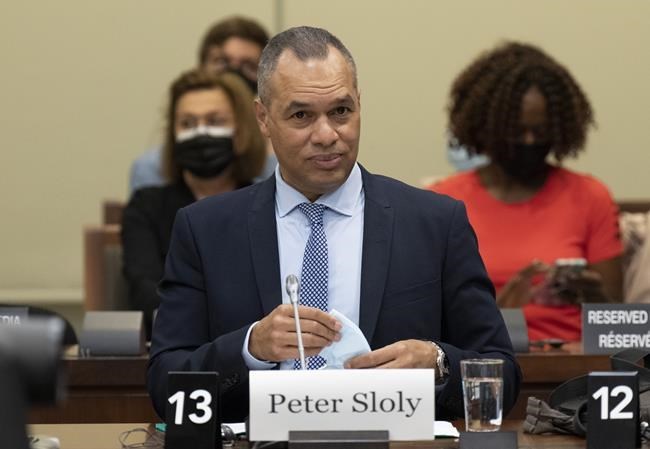OTTAWA — Canada’s institutions and police services were unprepared for the scale of the “Freedom Convoy” protest, says Ottawa’s former police chief, who resigned amid heavy criticism of the force’s handling of the demonstration.
Peter Sloly said Thursday the protest represents a “paradigm shift” in the kinds of security events facing Ottawa and he is calling for the street in front of Parliament Hill to be closed to vehicles to prevent another massive national security threat.
Sloly spoke out for the first time since he stepped down during the heat of the protest on Feb. 15, when Ottawa's downtown streets were seized by hundreds of big rigs, other trucks and thousands of demonstrators protesting COVID-19 restrictions and the Liberal government.
"Institutionally and nationally, we were unprepared for it. Locally, we were unprepared for it," Sloly told a parliamentary committee, citing the protesters' unprecedented level of planning, logistics, counter-intelligence, organization, financial resources and commitment.
Police intelligence did not know the scale of the protest that was coming, and Sloly said the information they had at the time didn't suggest that any area needed to be blocked off.
He said there was no way for police to have the perfect response to the perfect storm that visited Ottawa and various Canadian border crossings earlier this year.
In response to the convoy protest, Sloly suggested placing Wellington Street under the jurisdiction of Parliamentary Protective Services instead of the Ottawa police, though he warned that would be a costly solution because the service isn't equipped to respond to the daily events on the street like mental health and addictions calls, or sexual assaults and gang-related activities.
A jurisdiction change also wouldn't completely solve the communication issues between the six police agencies that operate in and around Parliament Hill, he said.
Earlier this week, the city councillor for downtown Ottawa, Catherine McKenney, described to the committee the state of lawlessness that set in during the convoy in residential neighbourhoods.
"Where where were our police? Well, they were protecting Parliament Hill," McKenney told the committee.
"The City of Ottawa simply does not have the capacity to protect federal properties during major national events, and also patrol our neighbourhoods."
Public Safety Minister Marco Mendicino wouldn't say whether the federal government is willing to take on the additional cost of policing Wellington Street, but said something needs to change.
"There is no question in my mind that we need to, I think, find new ways to better collaborate and co-ordinate police of jurisdiction with different levels of law enforcement -- whether it's provincial police services or the RCMP -- and I'm looking forward to having that discussion," he told reporters Thursday.
Sloly told the House of Commons procedure committee the easiest way to prevent another national security threat from approaching Parliament Hill would be to close Wellington Street to traffic and install barriers and bollards to control the flow of people and potential threats.
"I think it needs to be, in general, control of the movement of people and things through the parliamentary precinct given the security required for such an important area for Canadians," Sloly said.
Sloly did not speak about the circumstances of his departure from the Ottawa Police Service and did not stop to speak to reporters on his way out of the committee. He did say he spoke to the committee as part of his "continuing commitment to this city."
Sen. Vernon White, who served as Ottawa police chief from 2007 to 2012, also told the committee he's been advocating for the closure of Wellington Street and Elgin Street near the National War Memorial since a terrorist stormed the Hill in 2014.
"Within 72 hours of that shooting, people wanted to get back to the way things were, making Parliament Hill accessible to everybody," White said.
As well as blocking traffic from Wellington, White said it's important to look at pedestrian traffic near the Hill. With so many access points, it's possible to get right up to the Parliament buildings without being detected.
Wellington Street has remained closed since the massive police operation on the weekend of Feb. 18, when police dislodged encampments of protesters and removed big-rig trucks from the area. Traffic lights have since temporarily been removed from the street until the City of Ottawa finishes studying whether the street should reopen later this year.
In addition to changing the jurisdictional responsibility for the area and blocking off streets, Sloly suggested more funds for the cross-jurisdiction command centres so that different police agencies in the area can work together more effectively.
This report by The Canadian Press was first published June 2, 2022.
Laura Osman, The Canadian Press

